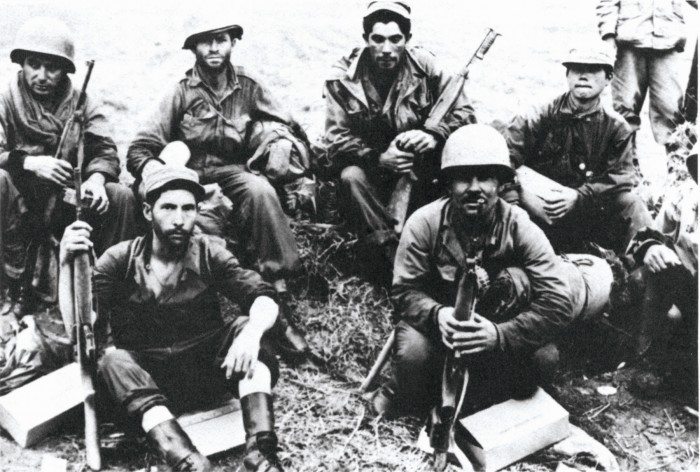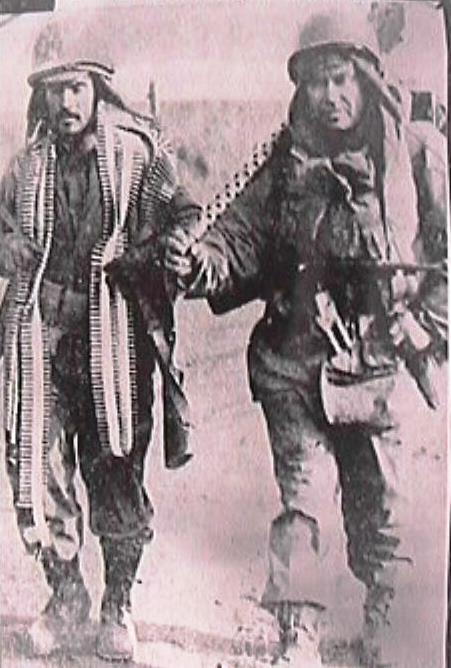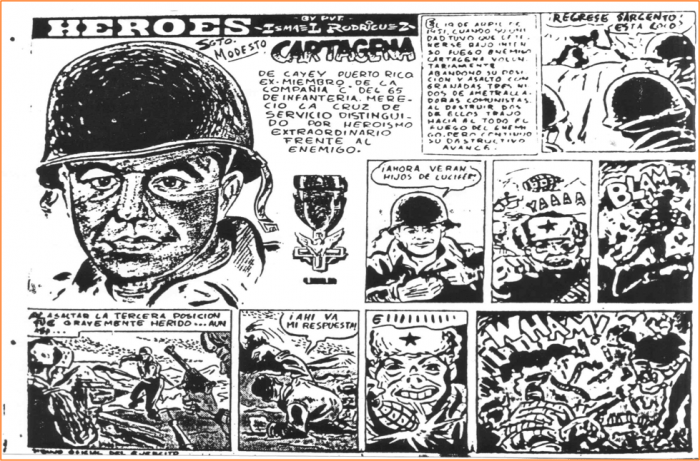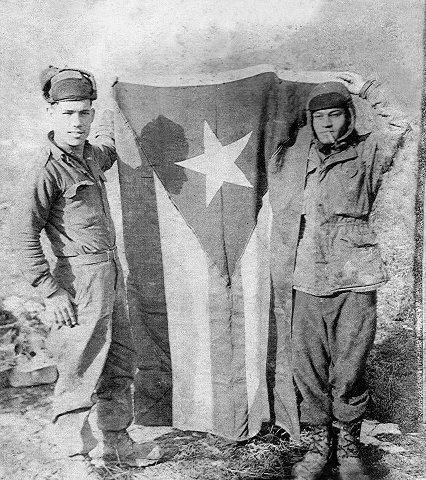Yesterday, President Barack Obama awarded the Congressional Gold Medal to the 65th U.S. Army Infantry Regiment, also known as the “Borinqueneers.” A decade ago no one would have predicted such an occasion nor was the 65th as popular as it is now. Not only was the 65th virtually forgotten by Puerto Ricans but the contribution of hundreds of thousands of Puerto Ricans who have served in the armed forces has also been largely ignored by the general public.
When the Korean War broke out, most Puerto Ricans were still confined to the segregated 65th or one of Puerto Rico’s National Guard outfits. The 65th fought in Korea from 1950 to 1953 as part of the U.S. 3rd Infantry Division.The enlisted men, non-commissioned officers, and the majority of junior officers in the 65th were Puerto Ricans, while most senior officers were continental Americans. The fact that Puerto Ricans were segregated and led mostly by continental Americans qualified them as colonial troops. During the Korean War, they were sent to fight as first-line troops for the first time.
Since its inception on May 20, 1899, to its transformation into an integrated outfit in 1953, the 65th never lacked for enthusiastic volunteers to fill its ranks. Most Puerto Ricans regarded the 65th as “our heroic regiment.” During the Korean War, “el sesenta y cinco” became a Puerto Rican icon. However, little or anything was known about the 65th a few decades after the war. Those growing up in Puerto Rico and many visitors have seen the monuments or transited through the Avenida 65 de Infantería. But the role that these soldiers played during the Korean War and what their sacrifice meant for Puerto Rico and the United States, for Puerto Ricans and Latinos in general, was, sadly, forgotten or unknown.
In 1999, when I was preparing to initiate graduate studies in Philadelphia, I came across a Sunday edition of The San Juan Star, which featured Noemi Figueroa Soulet and her efforts to gain support to produce a documentary on el 65. I was impressed with what I read and decided to conduct my own research on the 65th as I trained as a military historian. Figueroa Soulet ignited the flame that lead to many individuals and groups to dedicate their time to rescue the regiment’s history. Now, a first-rate documentary (The Borinqueneers), an official battle history, several magazine articles, academic works and studies, oral histories, as well as many fiction works have been produced exploring the 65th.
Recovering the history of the 65th required researchers to face moments of the 65th’s history which were not easy to digest. At moments their story reads as glorious, at other times like tragedy and injustice. I will try to briefly summarize their history until the Korean War and then explain the significance of their participation in that war and of the ongoing effort to secure the Congressional Golf Medal.
Not too long after the cannons felt silent in the Spanish-Cuban, Filipino-American War of 1898, Puerto Ricans started to serve in the U.S. military. On May 20, 1899, General Davies published General Order No. 65 authorizing the formation of the battalion of Porto Rican Volunteers. Oddly enough, the first volunteers came from the town of Lares, where anti-Spanish and pro-independence sentiment had been strong since the second half of the nineteenth century.
The military authorities added a cavalry battalion and changed the name of the Porto Rico Battalion to the Porto Rico United States Volunteers (P.R. U.S.V.) in 1900. With World War I imminent, Puerto Rican troops saw their role extended to include the defense of the Panama Canal. Upon their return to Puerto Rico in 1920, they found their names changed from the “Porto Rican Regiment” to the “65th Infantry, U. S. Army,” courtesy of the National Defense Act of 1920.
The 65th served in North Africa and Europe during World War II, although not as first-line troops. The regiment went to the European theater, while the defense of the Panama Canal and the island was entrusted to the 295th and 296th Infantry Regiments of the Puerto Rico National Guard. When the men of the 65th returned home in 1945, they were received like heroes by an enthusiastic multitude crowding the streets of San Juan.
On June 24, 1950, war broke out in Korea. In Puerto Rico, the National Guard was activated, and the 65th was mobilized and soon ordered to Korea. The island’s participation in the Korean War was more significant than in previous wars since Puerto Ricans were entering this conflict very early, and they were going in as first-line combat troops. About 61,000 Puerto Ricans served in the U.S. armed forces during the Korean War. Many served with the 65th , and the vast majority were volunteers. More importantly, the chance that they may be sent to the 65th motivated thousands of Puerto Ricans to volunteer for service. Throughout the war 747 Puerto Ricans were killed in action (KIA).
The public and private sector in Puerto Rico joined to support the 65th throughout the war. Governor Luis Muñoz Marín often made reference to the men of the 65th in his speeches. The island’s public buses and train carts sported the 65th’s unit crest. Plazas and avenues were named to honor the regiment. Returning soldiers, especially the wounded, were received as heroes and treated to public receptions by government officials. Muñoz Marín himself attended the burials of the fallen and sent his recorded speeches to the troops in Korea. In those early days of the war, a day did not pass in which the island’s press did not write about the Puerto Rican soldiers. Soldiers were paid to endorse local products, from non-alcoholic malt beverages to powder milk and some of the soldiers’ exploits even found their way to comic strips. The Puerto Rican soldier had in fact become a quintessential figure on the island and among the growing diaspora—the 65th became a national icon.
The Borinqueneers themselves knew they were on the spotlight, and came to internalize their iconic status. On Christmas Eve of 1950, the Borinqueneers of the 65th Infantry, the last United Nations troops in Hungnam, were finally evacuated from the besieged port. As the 65th’s commanding officer, Colonel William W. Harris, boarded the last transport, someone handed him a copy of an article from the Pacific Stars & Stripes. The article quoted Corporal Ruiz of Puerto Rico as saying: “We are proud to be part of the United Nations Forces, and we are proud of our country. We feel that too many people do not know anything about Puerto Rico; they think that we are all natives who climb trees.” Ruiz and many other soldiers in the 65th fighting in Korea felt they had to prove they were second to none. Ruiz added: “We are glad for the chance to fight the communists and also for the chance to put Puerto Rico on the map. It will be a great accomplishment if we can raise the prestige of our country in the eyes of the world.”
Things would change during the second half of the war and the record of the Borinqueneers would be temporarily stained by a series of mass court martial. Eventually, their record would be restored. A culmination of the restoration process is receiving the Congressional Gold Medal.
Obtaining such award comes from the effort of the “Borinqueneers CGM Alliance” (BCGMA) founded by former Army Captain and Iraq War veteran, Frank Medina. The medal has been awarded to other famous minority units, including the Tuskegee Airmen, the Navajo Code Talkers, the Nisei Soldiers and the Montford Point Marines. The Borinqueneers was the first Korean War unit to receive the award.
The ethnicity and race of the Gold Medal recipients is no coincidence. All these recipients fought under times of crisis to defend a country that at the time treated them at best like second-rate citizens and at worst like foreign threats. African-American marines and aviators disproving the myth of racial inferiority and unfitness for military service, Navajo talkers using their native language for communications saving countless of American lives at a time when Navajo kids were being beaten for speaking their own language at school, Nissei soldiers who volunteered to join the U.S. Army as their own families were being sent to internment camps by the U.S. government—those are the type of people whom this medal recognizes.
And that is the kind of contribution that the Borinqueneers made. They were willing to pay the ultimate price at a time when Puerto Ricans were openly called “a problem” in academic works and the American press.
***
Harry Franqui-Rivera, Ph.D., is a historian and researcher at the Center for Puerto Rican Studies at Hunter College, CUNY.






